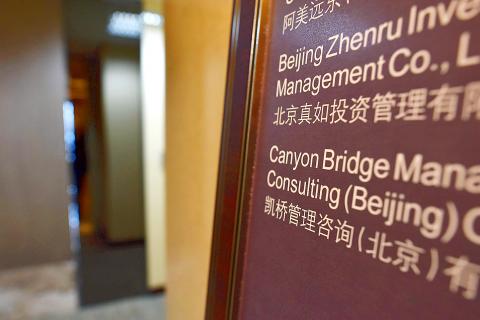US President Donald Trump on Wednesday blocked a Chinese government-financed firm’s acquisition of an Oregon semiconductor maker on national security grounds.
A US federal panel that reviews foreign investment in the US for possible security threats ruled against the proposed US$1.3 billion purchase of Lattice Semiconductor last week.
The deal has been under scrutiny since it became clear the buyer, Canyon Bridge Capital Partners, is funded by the Chinese government.

Photo: AFP
Chinese companies are on a global buying spree to acquire technology and brands. Most acquisitions in the US and Europe go through without incident, but some purchases of high-tech companies have prompted criticism they might represent security threats or the loss of important national assets.
“Credible evidence leads me to believe” the buyers of Lattice “might take action that threatens to impair the national security of the United States,” Trump said in his order.
A statement from the White House press secretary cited the importance of “semiconductor supply chain integrity” to US security, the Chinese government’s role in supporting the transaction and the potential transfer of intellectual property to a foreign buyer.
It was just the fourth time in a quarter century that a US president has ordered a foreign takeover of an American firm stopped on national security concerns.
Trump has expressed concern about the status of US manufacturing and its ability to meet national security needs.
In July, he issued an order for a review to be led by the US Department of Defense. He also has asked the US Department of Commerce to look into whether to raise tariffs on imported steel on national security grounds.
Following Trump’s announcement, Lattice said it was canceling the proposed sale.
Ministry of Commerce spokesman Gao Feng (高峰) yesterday told a media briefing in Beijing, that China is concerned over the matter and that the US should create a fair and transparent business environment.
“Conducting security checks on a sensitive investment is a nation’s legitimate right, but it shouldn’t be used as a protectionist tool,” Gao said, adding that the acquisition is a corporate decision that the US should evaluate objectively.
Lattice manufactures a relatively low-tech class of programmable computer chips that can be adapted for a variety of uses. It had 1,000 employees worldwide at the end of the last year, but that number dwindled after Lattice sold a division in India and laid off workers.
In December last year, the German government blocked the Chinese purchase of a chipmaker, Aixtron SE, after then-US president Barack Obama prohibited the buyer from taking over its California subsidiary on national security grounds.
Additional reporting by Bloomberg

The CIA has a message for Chinese government officials worried about their place in Chinese President Xi Jinping’s (習近平) government: Come work with us. The agency released two Mandarin-language videos on social media on Thursday inviting disgruntled officials to contact the CIA. The recruitment videos posted on YouTube and X racked up more than 5 million views combined in their first day. The outreach comes as CIA Director John Ratcliffe has vowed to boost the agency’s use of intelligence from human sources and its focus on China, which has recently targeted US officials with its own espionage operations. The videos are “aimed at

STEADFAST FRIEND: The bills encourage increased Taiwan-US engagement and address China’s distortion of UN Resolution 2758 to isolate Taiwan internationally The Presidential Office yesterday thanked the US House of Representatives for unanimously passing two Taiwan-related bills highlighting its solid support for Taiwan’s democracy and global participation, and for deepening bilateral relations. One of the bills, the Taiwan Assurance Implementation Act, requires the US Department of State to periodically review its guidelines for engagement with Taiwan, and report to the US Congress on the guidelines and plans to lift self-imposed limitations on US-Taiwan engagement. The other bill is the Taiwan International Solidarity Act, which clarifies that UN Resolution 2758 does not address the issue of the representation of Taiwan or its people in

US Indo-Pacific Commander Admiral Samuel Paparo on Friday expressed concern over the rate at which China is diversifying its military exercises, the Financial Times (FT) reported on Saturday. “The rates of change on the depth and breadth of their exercises is the one non-linear effect that I’ve seen in the last year that wakes me up at night or keeps me up at night,” Paparo was quoted by FT as saying while attending the annual Sedona Forum at the McCain Institute in Arizona. Paparo also expressed concern over the speed with which China was expanding its military. While the US

SHIFT: Taiwan’s better-than-expected first-quarter GDP and signs of weakness in the US have driven global capital back to emerging markets, the central bank head said The central bank yesterday blamed market speculation for the steep rise in the local currency, and urged exporters and financial institutions to stay calm and stop panic sell-offs to avoid hurting their own profitability. The nation’s top monetary policymaker said that it would step in, if necessary, to maintain order and stability in the foreign exchange market. The remarks came as the NT dollar yesterday closed up NT$0.919 to NT$30.145 against the US dollar in Taipei trading, after rising as high as NT$29.59 in intraday trading. The local currency has surged 5.85 percent against the greenback over the past two sessions, central